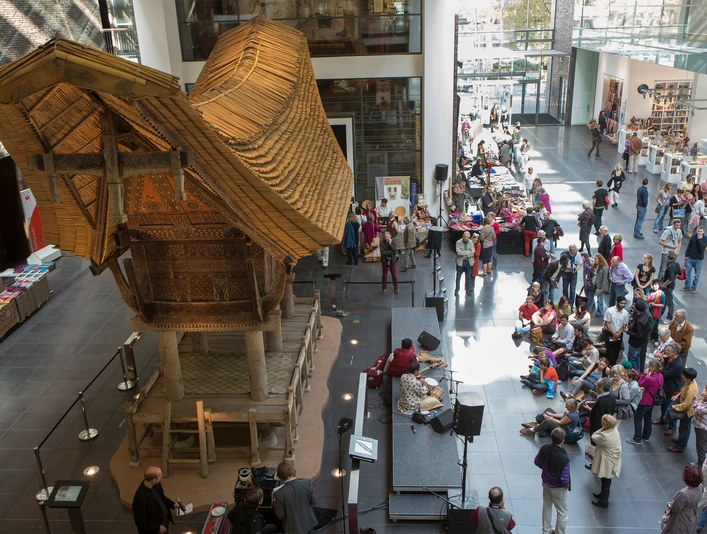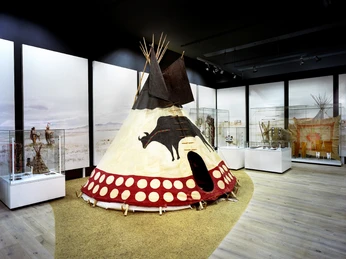At all times, in every culture around the world, people have asked similar questions and had similar concerns but developed different solutions. The Rautenstrauch-Joest Museum gives you the space to explore these various answers for yourself. Multimedia and interactive, either during a public tour or with an audio guide for thematic tours, highlight tours, or as a children's tour. The Rautenstrauch-Joest Museum is one of the ten museums in Germany with the most significant ethnographic collections, yet it manages to ensure that its 65,000 objects have nothing in common with the mere display of dusty artifacts from collection travelers. Rather, this extraordinary museum takes you on a world tour to other cultures. If you are familiar with ethnological exhibitions, you will really experience something new here. Promise!
RJM: Since 2010 in the Heart of Cologne
The lighting and spatial concept ensure immersion in the lively designed exhibit world of a modern, versatile museum, which also merits itself by the acquisition history of its exhibits as well as the collection in image, word, and deed. The vibrant museum concept – understanding people in their worlds – offers lasting impressions of cultures around the globe: with objects from Oceania, Africa, Asia, and America. For a visit – alone, with a partner, or with children, you should plan enough time, as it is known that time flies by with exciting impressions.The Permanent Exhibition: Cultures of the World
The core of a museum is its permanent exhibitions – and this is no different for the Rautenstrauch-Joest Museum. In the permanent exhibition, you will find a theme course, an arrangement of underlying human themes such as living or dying, unfolded according to the different perspectives and ways of dealing in various cultures. Roughly, there are two complexes or lines: on the one hand, Europe's view of the rest of the world, and on the other, the portrayal of life designs elsewhere around the globe. 3,600 sqm are available for viewing. Your discovery journey leads you on a tour through the ground floor – where the huge Indonesian rice barn and the 50-instrument Gamelan orchestra welcome you – over the 1st floor with outstanding artworks and reflection on the role of an ethnological museum itself to the 2nd floor with objects around jewelry, death, faith, clothing, and the afterlife.Special Exhibitions, Reflection Spaces, and Actions
Besides the permanent exhibition, the Rautenstrauch-Joest Museum of course also regularly offers special exhibitions and other events. By way of example, the event about the planned restitution of the Benin Bronzes from Nigeria, which was accompanied by great media attention, was mentioned – with the title "I MISS YOU". Moreover, the museum concept reserves the exhibition space "Focus" for critical reflection of its own ethnological collection and dialogue with source communities. Under the title "Interventions," various artists, students, associations, or the museum itself can consider actions and approaches in different sizes and appearances.Guided Tours, Workshops & More: Many Perspectives
For your visit, you have the opportunity to join one of the public tours – or use an audio guide: for the theme course, selected highlights of the museum, or if you are with children. Download your audio guide MP3s here. Besides the exhibitions, the RJM program offers workshops for adults and children, but also film screenings, concerts, or participatory tours. The event calendar lists all events taking place in the coming months. Check it out before your visit. A special meeting place for discussion, reading, and watching films is also provided by the site BAUSTELLE – as an Open Space of the museum.History: Over 100 Years Old
Originating from the private collection of 3,500 objects by the world traveler Wilhelm Joest, the Museum of Ethnology has existed in Cologne since 1906. Today it gathers approximately 65,000 objects, 100,000 historical photographs, and 40,000 specialist books from donations, bequests, or acquisitions financed by patrons. It not only displays exhibits but also engages in restoration, research, and many other works within its vast network. Originally, the museum was located at the Ubierring, but World War II took its toll on the building in Cologne's southern city, as did the Cologne Centennial floods in 1993 and 1995, making the museum accessible at the new building at Neumarkt since 2010. Since its opening, the Rautenstrauch-Joest Museum has received awards – such as the 2012 Museum Prize of the Council of Europe. An important part of the collection dates back to the time before the First World War; Cologne was a stronghold of the German colonial movement – and the development of ethnology as an independent subject falls into the 19th and 20th centuries, which knew not just travel and discoveries but also colonial oppression. The first restitution took place in 2018 – with the mummified head Toi Moko to Aotearoa/New Zealand. The active processing of the collection's history has long been a firmly established part of the museum's work.Useful Information
Eligibility
Bad Weather Offer
Suitable for any weather
for Groups
for Class
for families
for individual guests
Suitable for the Elderly
Openings
Tuesday to Sunday 10 - 18 o'clock
Thursday 10 - 20 hrs
Every first Thursday of the month 10 - 22 o'clock
Monday closed
open on public holidays (also on Mondays!) as on Sundays
Thursday 10 - 20 hrs
Every first Thursday of the month 10 - 22 o'clock
Monday closed
open on public holidays (also on Mondays!) as on Sundays
Price info
Price adult: €7.00
Price reduced: €4.50
Parking facilities
By public transport:
Neumarkt stop (2 minutes walk).
KVB lines 1, 3, 4, 9, 16, 18
Bus lines 136, 146
Neumarkt stop (2 minutes walk).
KVB lines 1, 3, 4, 9, 16, 18
Bus lines 136, 146
General information
Parking Available
Bus stop available
Nearby


